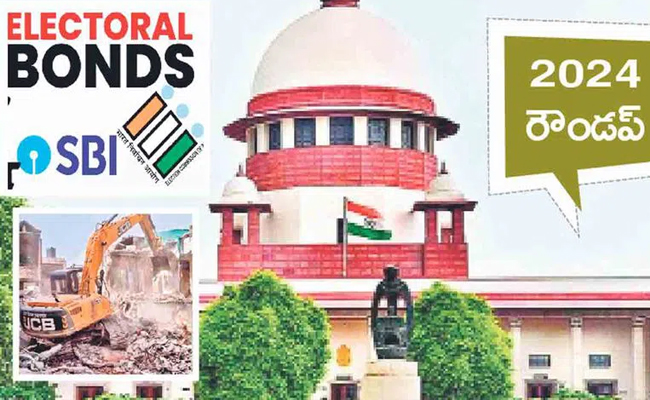This year, the Supreme Court of India served as a platform for several landmark judgments addressing issues of law, society, politics, discrimination, identity, and national interests. Additionally, key reforms were introduced, such as replacing archaic laws with the Bharatiya Nyaya Sanhita (BNS), Bharatiya Nagarik Suraksha Sanhita (BNSS), and Bharatiya Sakshya Bill (BSB). Notably, the Supreme Court also unveiled a new statue of the Goddess of Justice, without a blindfold but holding the Constitution.
Furthermore, Chief Justice of India DY Chandrachud retired this year, with Justice Sanjiv Khanna succeeding him. Here's a look at ten significant rulings by the Supreme Court in 2024 that shaped the nation's trajectory:
-
Bilkis Bano Case
On January 8, the Supreme Court overturned the Gujarat government's decision to grant remission to 11 convicts in the Bilkis Bano case, involving gang rape and the murder of seven members of her family during the 2002 Gujarat riots.
-
Electoral Bonds
On February 15, the Supreme Court declared the sale of electoral bonds unconstitutional, stating that the scheme, introduced to facilitate anonymous donations to political parties, was not tenable in a democracy.
-
Corrupt Lawmakers Not Above the Law
On March 4, the Constitution Bench ruled that Members of Parliament and Legislative Assemblies accepting bribes for votes or speeches cannot escape prosecution. This overturned a 1993 JMM bribery case judgment favoring lawmakers.
-
Sub-Categorization of SC/ST Quotas
On August 1, the Supreme Court allowed the sub-categorization of Scheduled Castes (SC) and Scheduled Tribes (ST) for better distribution of benefits in jobs and educational institutions, terming it constitutional.
-
Child Pornography
On September 23, the Court ruled that possession of child pornography material is a punishable offense under the Protection of Children from Sexual Offenses (POCSO) Act.
-
Citizenship Act, Section 6A
On October 17, the Supreme Court upheld the constitutional validity of Section 6A of the Citizenship Act, granting citizenship to certain categories of illegal migrants in Assam.
-
UP Madrasa Education Act
On November 5, the Court declared the Uttar Pradesh Madrasa Education Act, 2004, constitutional, rejecting the Allahabad High Court's direction to integrate madrasa students into the mainstream school system.
-
Minority Status for Aligarh Muslim University
On November 8, the Court upheld the minority status of Aligarh Muslim University (AMU) under Article 30 of the Constitution, affirming its foundational rights.
-
'Bulldozer Justice' Criticism
On November 13, the Supreme Court condemned the arbitrary demolition of properties by state governments as part of "bulldozer justice," emphasizing that such actions bypass legal due process and violate constitutional principles.
-
Caste-Based Discrimination in Prisons
On October 13, the Court denounced caste-based discrimination in prisons, including segregation in labor and living arrangements, deeming such practices unconstitutional.
These judgments underscore the Supreme Court's critical role in shaping a progressive legal and social framework for the nation.

